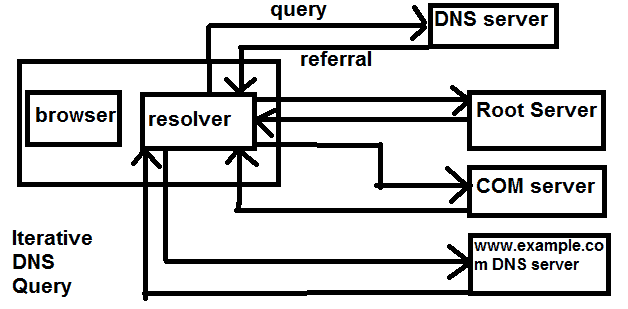An iterative query in DNS is a process where a name server resolves a domain name into its IP address by making requests to other name servers, without taking on the responsibility of querying all the way to the final data itself. Instead, it receives referrals to other name servers that are closer to the information requested.
This article delves into the nuts and bolts of iterative queries, contrasting them with recursive queries, to shed light on their critical role in the domain name resolution process. Join us as we navigate the intricacies of DNS lookups, enhancing your understanding of how the internet organizes and accesses information.
In this article:
- What is an Iterative Query?
- Iterative vs. Recursive DNS Queries
- Understanding DNS Lookup Process
- Troubleshooting Common DNS Query Issues
- References

1. What is an Iterative Query?
At its core, an iterative query is a method utilized by DNS servers to resolve a domain name into an IP address through a step-by-step referral system. Unlike a recursive query, where the resolver is responsible for the legwork of obtaining the final answer, an iterative query places the onus on the initial requesting server to make subsequent queries based on referrals. This process is akin to being given directions in stages: “Go to this point, and from there, you’ll be told where to go next.”
Step-by-Step Process
- Initial Request: It all begins when a resolver, typically operated by your ISP, receives a query for a domain like
www.alpine.expedia.com. If this request falls outside its authoritative zone, the journey of iterative queries commences. - Root Name Server Referral: The resolver first reaches out to a root name server. Instead of providing the final IP address, the root server directs the resolver to the name server responsible for the
.comtop-level domain (TLD). - TLD Name Server Referral: Upon querying the
.comTLD name server, the resolver receives another referral, this time to the name server handlingexpedia.com. - Second-Level Domain Resolution: The resolver then contacts the
expedia.comname server, which finally resolves the full query to the IP address ofwww.alpine.expedia.comor issues an error if the domain cannot be resolved.
This iterative approach ensures that no single server bears the full burden of resolution, distributing the load across the network and optimizing the resolution process by leveraging the hierarchical nature of DNS.

Iterative queries are foundational to the DNS infrastructure, enabling efficient data retrieval and management across the vast expanse of the internet. By understanding this process, network administrators and enthusiasts alike can gain insights into the complexities of web navigation and the underlying protocols that make it possible.
2. Iterative vs. Recursive DNS Queries
Key Differences
The primary distinction between iterative and recursive DNS queries lies in the resolution process and the responsibility of the querying server.
- Iterative Queries: In an iterative query, the DNS server responds to a request with the best information it currently has, which often is a referral to another server closer to the authoritative source. The original requester, usually a DNS resolver, must then query the referred server. This process repeats until the resolver reaches the authoritative server for the requested domain, or an error occurs.
- Recursive Queries: A recursive query, on the other hand, places the entire resolution burden on the queried DNS server. If this server does not have the answer, it must perform additional queries on behalf of the requester until it obtains the final answer or encounters an error, which it then returns to the original requester.
Use Cases and Implications
- Use Cases: Recursive queries are commonly used by ISPs’ DNS servers to simplify the process for end users, effectively hiding the complexity of DNS lookups. Iterative queries are utilized within the DNS infrastructure to distribute the load and leverage the hierarchical structure of the DNS system.
- Implications: Recursive queries can increase the load on DNS servers, as they take on the responsibility of resolving the domain names fully. Iterative queries, while reducing the load on any single server, require the requesting resolver to handle more of the resolution process, which can increase the complexity on the client side.
3. Understanding DNS Lookup Process
Role in Internet Navigation
DNS lookups play a crucial role in internet navigation, acting as the directory system that translates human-friendly domain names into IP addresses that computers use to identify each other on the network. This process ensures users can access websites using memorable domain names rather than numerical IP addresses.
Examples in Action
- Web Browsing: When a user enters
www.example.comin their web browser, the browser performs a DNS lookup to resolve the domain name into its corresponding IP address. - Email Delivery: Sending an email to
user@example.cominvolves a DNS lookup to determine the mail server’s IP address associated withexample.com.
4. Troubleshooting Common DNS Query Issues
Identifying Issues in Iterative and Recursive Queries
Common issues in DNS queries include:
- Timeouts: Caused by an unresponsive server or network congestion.
- NXDOMAIN errors: Indicate that the domain does not exist.
- SERVFAIL errors: Suggest problems with the DNS server itself or with its ability to communicate with upstream servers.
Solutions and Best Practices
- Monitoring and Logging: Implement monitoring on DNS servers to quickly identify and diagnose issues.
- Configuration Verification: Regularly verify DNS server configurations to prevent misconfigurations that can lead to errors.
- Cache Management: Properly manage DNS caches to ensure outdated or incorrect data is not used in resolutions.
5. References
- Books:
- “DNS and BIND” by Cricket Liu and Paul Albitz – Offers a comprehensive look at the DNS system, including query processes.
- “TCP/IP Illustrated, Volume 1: The Protocols” by W. Richard Stevens – Provides detailed explanations of underlying network protocols, including DNS.
- RFCs:
- Network Encyclopedia: